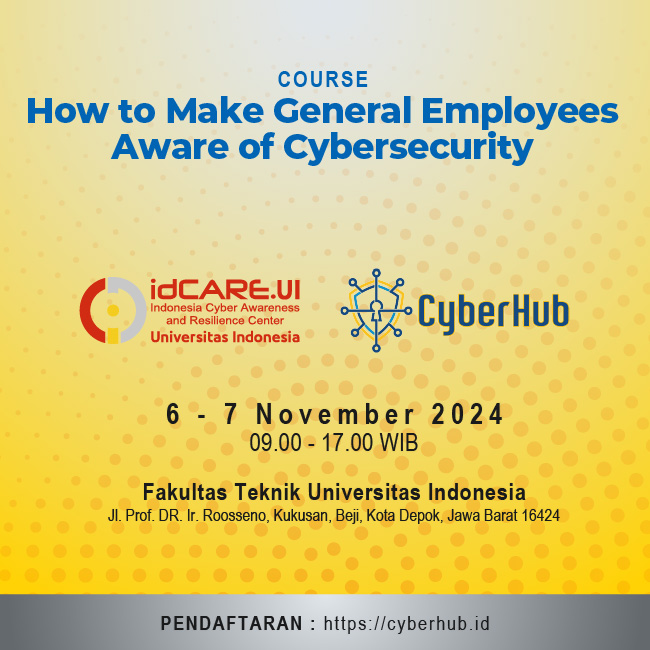

The How to Make General Employees Aware of Cybersecurity course is designed to equip participants with the tools and strategies needed to raise cybersecurity awareness among all employees within an organization. The course focuses on educating employees about the common cyber threats they may encounter, such as phishing, social engineering, malware, and password breaches, and emphasizes their role in protecting the organization from these risks.
Participants will learn how to create and deliver engaging cybersecurity training sessions tailored to non-technical staff, ensuring that the information is accessible and easy to understand. The course covers best practices for fostering a security-conscious culture, including developing ongoing communication campaigns, running simulations like phishing tests, and reinforcing positive security behaviors. By the end of the course, participants will be able to implement effective training programs that empower employees to recognize and respond to cyber threats, thereby reducing the likelihood of security breaches caused by human error.
MATERI KURSUS
The Fundamentals of Information Security lesson provides participants with a foundational understanding of key concepts and principles in cybersecurity. This lesson covers essential topics such as confidentiality, integrity, and availability (CIA triad), which form the core of information security. Participants will learn about the different types of security threats, vulnerabilities, and attack vectors that can compromise information systems, as well as basic techniques for safeguarding sensitive data and systems.
The lesson also introduces security frameworks and best practices, such as encryption, authentication, access control, and network security measures, helping participants understand how these concepts are applied to protect organizational assets. By the end of the lesson, participants will be equipped with the knowledge necessary to identify and address common security challenges, laying the groundwork for more advanced cybersecurity strategies.
The Fundamentals of Cybersecurity lesson offers participants a comprehensive introduction to the core principles and practices essential for protecting digital assets and systems. This lesson covers the fundamental concepts of cybersecurity, including the CIA triad (Confidentiality, Integrity, Availability), which form the backbone of security strategies. Participants will explore various types of cyber threats, such as malware, phishing, and ransomware, along with vulnerabilities that attackers exploit to compromise systems.
Additionally, the lesson delves into key cybersecurity techniques, including encryption, firewalls, intrusion detection systems, and access control mechanisms, providing participants with a solid foundation for understanding how to defend against cyberattacks. Emphasis is placed on the importance of creating a proactive security posture, which includes risk management, security policies, incident response planning, and continuous monitoring. By the end of the lesson, participants will have the foundational knowledge to recognize cyber threats and implement basic cybersecurity measures within their organizations.
The Risks and Vulnerabilities lesson focuses on identifying and understanding the potential risks and weaknesses in an organization’s digital infrastructure that cybercriminals can exploit. Participants will learn about the different types of vulnerabilities, such as software bugs, outdated systems, misconfigured security settings, and human error, that can lead to cyber incidents. The lesson explores how these vulnerabilities can be exploited through various attack vectors, including malware, phishing, and network intrusions.
In addition, participants will be introduced to risk management concepts, such as how to assess, prioritize, and mitigate risks based on their potential impact on the business. They will learn to conduct vulnerability assessments and penetration testing as part of a broader strategy to identify and address security gaps. By the end of the lesson, participants will have a thorough understanding of how to evaluate and reduce the risks posed by cyber threats, ensuring a more resilient security posture for their organization.
The Incident Response lesson is designed to equip participants with the skills and knowledge needed to effectively manage and respond to cybersecurity incidents. This lesson covers the stages of a well-structured incident response process, including preparation, detection, containment, eradication, recovery, and post-incident review. Participants will learn how to develop an incident response plan, which outlines the roles and responsibilities of key team members, communication protocols, and steps for minimizing damage during a cyberattack.
Through practical examples and scenarios, participants will explore how to quickly identify security breaches, isolate affected systems, and mitigate the impact of the incident while ensuring business continuity. The lesson also emphasizes the importance of post-incident analysis and reporting to identify the root cause of the incident and improve future responses. By the end of the lesson, participants will have the confidence to lead or contribute to a robust incident response team, ensuring their organization can quickly recover from cyber threats while minimizing risks and losses.
The Introduction to Security Awareness lesson is designed to provide participants with a fundamental understanding of the importance of cultivating a security-conscious culture within an organization. This lesson emphasizes the human element in cybersecurity, highlighting how employees at all levels can either be the first line of defense or a vulnerability in protecting against cyber threats. Participants will learn about common cyber risks such as phishing, social engineering, and password breaches, and how these threats target individuals to gain access to sensitive information.
The lesson also focuses on best practices for raising security awareness among staff, including implementing security training programs, promoting safe online behavior, and encouraging a proactive approach to reporting suspicious activities. By understanding how to engage employees in cybersecurity efforts, participants will be able to create a workplace environment where security is everyone's responsibility, thereby reducing the risk of human error leading to security incidents.
The Designing & Developing Security Awareness Program lesson provides participants with the skills and strategies necessary to create an effective, organization-wide cybersecurity awareness initiative. This lesson covers the essential components of a security awareness program, including identifying target audiences, defining key security topics, and determining learning objectives based on organizational needs and risks. Participants will learn how to structure the program to cover areas such as phishing prevention, safe internet usage, password management, and recognizing social engineering attacks.
The lesson also explores various delivery methods, such as workshops, e-learning modules, interactive simulations, and continuous reinforcement through internal communications and reminders. Emphasis is placed on creating engaging content that resonates with employees at all levels, ensuring that the program fosters a culture of security mindfulness. Participants will also learn how to measure the effectiveness of their security awareness initiatives through assessments, feedback, and incident reduction metrics. By the end of the lesson, they will be equipped to design and implement a tailored security awareness program that enhances the overall security posture of their organization.
The Implementing Security Awareness Program lesson focuses on the practical steps required to roll out an effective cybersecurity awareness initiative across an organization. Participants will learn how to translate the design of a security awareness program into actionable plans, ensuring smooth deployment and engagement from all employees. The lesson covers key implementation strategies, such as securing executive buy-in, setting up timelines, coordinating training sessions, and choosing the right tools and platforms for delivery.
Participants will also explore ways to promote the program within the organization, using techniques such as gamification, regular communication, and incorporating real-world cyberattack scenarios to keep employees engaged. Additionally, the lesson emphasizes the importance of monitoring and adapting the program based on employee feedback and the organization's evolving threat landscape. By the end of this lesson, participants will have the knowledge and skills to successfully implement and sustain a security awareness program, creating a culture of cybersecurity vigilance and reducing human-related risks.
The Evaluating Security Awareness Program lesson teaches participants how to assess the effectiveness of their organization's cybersecurity awareness initiatives. This lesson covers the key metrics and evaluation methods needed to determine whether the program has successfully increased employee understanding of security threats and improved their ability to respond to cyber risks. Participants will learn how to gather and analyze data, such as employee quiz results, phishing simulation outcomes, and incident reports, to measure engagement and knowledge retention.
The lesson also explores how to conduct surveys and interviews to capture qualitative feedback, as well as how to track behavior changes over time to see if security practices are being applied consistently. Participants will be introduced to continuous improvement techniques, using evaluation results to refine training materials, improve delivery methods, and adjust the program to address new or emerging threats. By the end of the lesson, participants will be able to effectively evaluate and report on the performance of their security awareness program, ensuring it remains relevant, impactful, and aligned with the organization's cybersecurity goals.



